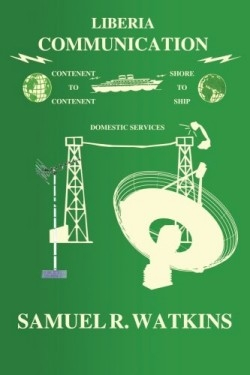Liberia Communication
“[i]Although the problem may be rooted in the past perception, the challenge is inspired by providence…. [U]nite and join forces for progress in love.”[/i]
Liberia Communication recounts one influential electronics engineer’s half-century of public service, and his efforts to connect the citizens of a developing West African state to the world of opportunity. Telecom breakthroughs, big and small, are heralded in a detached third-person voice. However, the frustration and fears marking recent decades under two successive warlords are at least as instructive as any technical accomplishment. Westerners are rewarded with a thoughtful history lesson on how a freedom-loving country can become enmeshed in the trade of conflict diamonds and child soldiers. Watkins’ foremost audience though consists of fellow Liberians. He wants to see the brainpower potential of younger people developed and applied to continuing improvement, both nationally and on the Pan-African level.
Here is a country independent for over one hundred fifty years, with long periods of political stability. Today citizens wish to eclipse the era of regressive suffering; they’ve elected their first female President. Strongman Charles Taylor awaits trial. The controllers of foreign capital are seeing a more rational basis for investment, a must if widespread problems of infrastructure are to be remedied. Watkins takes a commendably conciliatory tone, urging unity between all ethnic and interest groups.
The country is an unusual amalgam of fully indigenous people and descendants of freed slaves from the United States, the Caribbean, and South America. The U.S. and the Lone Star Republic usually sustain a cordial if flawed relationship, though the Reagan Administration’s support of Samuel K. Doe’s bloody military coup is a deep disappointment to the author. The United Kingdom has volunteered aid or defensive military backing during some periods of crisis. Both countries are popular study-abroad destinations for Liberians of means.
This book is a scholarly work in tone, subjects, and division, but there are not sufficient notations of references within the text to allow ready checking of factual statements, and the copy needs a light polish. If perceived as a fact-laden memoir, this book is informative without being particularly personal. Those engaged in Networks or Telecom careers may be able to follow the chapter on radio and internet protocols, and fully appreciate the challenges Watkins overcame to create Liberia’s first broadcast radio station. He has held numerous positions in government service and the field of education, serving currently as the President of the Pan African Telecommunications Technical Commission and Principal of the Mano River Institute.
A word of caution is in order for the sensitive. Descriptions of atrocities, especially those associated with the Doe government, are vividly appalling. The author is determined that earlier missteps be remembered, so as to move beyond. Liberia Communications is a history primer, a memoir, a call for progress, and a technical record rolled into one. It’s a fresh choice for readers on either side of the Atlantic Ocean.
Disclosure: This article is not an endorsement, but a review. The publisher of this book provided free copies of the book and paid a small fee to have their book reviewed by a professional reviewer. Foreword Reviews and Clarion Reviews make no guarantee that the publisher will receive a positive review. Foreword Magazine, Inc. is disclosing this in accordance with the Federal Trade Commission’s 16 CFR, Part 255.

